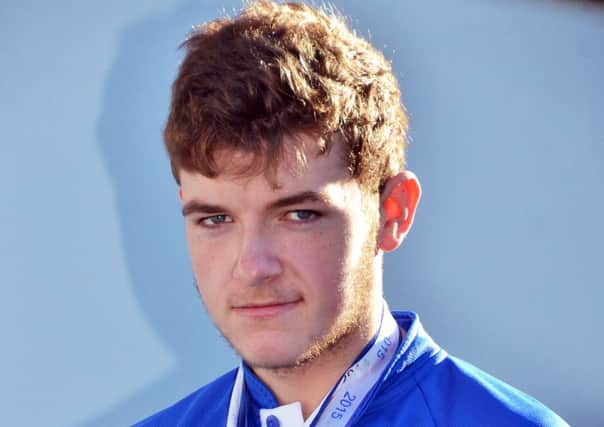Connor sets his sights on the Commonwealths


In addition to living with a disability officially diagnosed as congenital absence of the lower right forearm and hand, the teenager was also difficult to teach, overweight and temperamental.
But the joint influences of loving mum Michele Ingamells, encouraging teacher Chris Allen and Olympic swimming legend Michael Phelps have turned Connor’s life around dramatically to the point where he is now targeting qualification for the 2018 Commonwealth Games in Australia.
Advertisement
Hide AdAdvertisement
Hide AdMichele said: “Connor used to be withdrawn and he always had attitude problems, challenging authority both at home and school.
“He also had some negativity issues so I took him to the doctor, who suggested that I needed to get Connor involved in a sport because he had autistic spectrum disorder (ASD).
“But how can you get someone into sport who can’t talk to people, can’t stand losing and won’t listen to people?”
Conor - nicknamed the Fenside Fish - recently competed in the National Para-Swimming Championships in Manchester, where the Boston Amateur Swimming Club member competed in six races, coming second in the 200m individual medley.
Advertisement
Hide AdAdvertisement
Hide AdA far cry from Connor’s first taste of swimming at the age of eight, purely for safety reasons and his mum’s dislike of large stretches of water, including swimming pools.
Connor, 17, whose head coach is Ian Wells, said: “I enjoyed swimming but I’d never have joined a club without at first being convinced that it was right for me.
“At first, it was really hard for me to swim having just one arm, but when I started beating people and winning medals, I went down from being 19st to just 14st and grew 30cm as well.”
Connor’s transformation was also apparent in swimming competitions, winning gold in the 50m butterfly and silver in the 100m butterfly at the East Midlands Regional Disability Championships at Nottingham University in July 2014.
Advertisement
Hide AdAdvertisement
Hide AdMichele said: “When Connor started swimming competitively in September 2013, it was the first time that he was able to sleep through the night since birth.
“He wasn’t getting up during the night at all, his eating pattern changed and he learned how to handle his ASD as well.”
At the end of March 2015, Connor was invited to the British Para-Swimming Meet in Glasgow where he swam in five races after winning 50m butterfly gold and 100m butterfly silver at the West Midlands Regional Disability Championships in Rugby, two months after achieving the same feat in Nottingham.
Mr Wells said: “Connor often told me ‘I can’t do it’, but I wouldn’t take ‘can’t’ for an answer.
Advertisement
Hide AdAdvertisement
Hide Ad“I encouraged Connor to keep trying and, as a result, he moved through the swimming lessons stage and into the club itself.”
Last October, Connor brought back a gold (50m butterfly) and two silvers (100m butterfly and 100 individual medley) at the West Midlands Para-Swimming Championships which were again staged in Rugby.
This followed a haul of six medals from the East Midlands Para-Swimming Championships in Nottingham, including two golds (50m butterfly and 50m breaststroke) and four silvers (100m butterfly, 100m breaststroke, 50m and 100m freestyle).
Connor said: “I remember watching the London 2012 Olympics and Michael Phelps who has won more Olympic medals than anybody else which I really liked.
Advertisement
Hide AdAdvertisement
Hide Ad“But when I started swimming in competitions myself, I didn’t think much of it.
“Then I moved up to performance level standard with (governing body) British Swimming a year ago which means I have to do nine hours’ training a week in Boston.
“I still don’t think that much of the medals I’ve won and I care more about setting personal bests and beating my own times.”
There is of course a price to pay for being a potential Paralympic swimmer and Connor, along with Michele, is picking up the bill in the form of 90-minute swimming sessions, three mornings a week from 5.45am until 7.15am.
Advertisement
Hide AdAdvertisement
Hide AdThursday mornings bring with them a two-and-a-half hour session between 4.45am and 7.15am, plus further training at Boston’s Geoff Moulder Leisure Complex five nights a week between 5.30pm and 7pm, as well as an hour on Saturdays.
Michele said: “You don’t have a life as a swimming mum, from getting up at 4.30am in the morning to cooking salmon, steak, tuna, pasta and sweet potatoes, all for Connor. But he does like a big bar of chocolate as well.
“All I want for my son is for him to feel comfortable about himself, to be a well-rounded person and for me to be proud that he’s got his medals.”
As well as the physical and mental demands of swimming, Connor and Michele also face financial commitments which can mount up to several thousand pounds a year, including club fees, swimming gear, gym membership, accommodation and travel costs, nutrition and competition entry levies.
Advertisement
Hide AdAdvertisement
Hide AdFortunately, Connor has a sponsorship deal with Boston fencing company Calders & Grandidge which could be rewarded with qualification for the European Para-Swimming Championships in Portugal this summer.
“My life has changed quite a bit and I feel much more confident, fitter and able to do a lot more activities without being tired,” Connor said.
“I want to take part in the 2020 Paralympic Games in Japan and break both the 50m and 100m butterfly world records.”